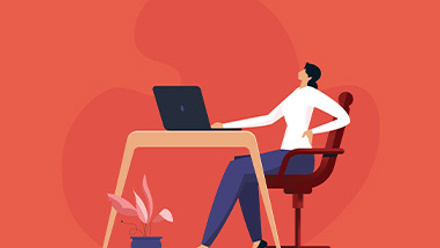Mature home workers can lead the way during pandemic
One of the challenges this brings is separating work and home life. According to a survey carried out by BHSF in 2018, mature workers aged over 40, are more inclined to check their work emails outside of normal working hours, with 54% of people over 51 doing this. Just under half of 41–50-year-olds also keep track of their work emails outside of contracted hours on a daily basis when working from home.
Checking emails
Dr David Poots, senior occupational health physician at BHSF, believes checking work emails outside of normal working hours could lead to mental burnout.
“We’re in an era now where smart, compact devices and faster internet connections have made working from all over the world, at any time, a possibility. The number of people working from home is only going to increase with the coronavirus outbreak ongoing.
“People who are in the 41–50 age bracket and over 51s, may well be in senior and management roles. With this, comes greater responsibilities and younger employees looking up to them for advice. On top of this, older people may have parenting responsibilities. It all adds up.
“For anyone, I’m sure the last thing they want to be doing is checking work emails or taking calls late at night outside of their working hours. Which is why it is vital that employers put in measures to ensure all their employees can work to the best of their abilities and boost their productivity. This can have a significant impact on their mental wellbeing.”
Presenteeism
The fact mature employees are more inclined to work outside their contracted hours could be a sign of presenteeism. Presenteeism costs the UK economy £15.1bn every year.
People who are over 51 and work from home, are more likely to have feelings of loneliness, isolation, depression and being forgotten about, according to our survey. Dr Poots believes employers have a role in helping mature home workers.
“Having regular phone calls, team meetings through video conferencing and using internal messaging, are just some of the ways mature workers can feel more inclusive and part of the team.
“No employee should ever feel they are alone and shouldn’t be afraid to ask any questions if they are not sure of anything. An employer should be able to provide relevant physical and mental health support where needs be.”
Moving about
Mature home workers may be more tempted to look at their work emails outside of working hours however, they are also the ones who are more likely to build exercise into their working day. BHSF found two-thirds of 41–50-year-olds are active every day, compared to 28% of 18–30-year-olds. Dr Poots feels employers must encourage home workers to move about.
“With home working, there is a chance that workers can spend hours in the same position which can result in poor posture. Spending a lot of time sitting down can be bad for people’s health, contributing to higher rates of diabetes and cardiovascular disease.
“In order to help home workers separate their home and work lives, employers could consider introducing written guidelines on communicating outside of work hours. This can help to achieve a healthy work-life balance among these employees, and manage their mental wellbeing.
“Employees should also take responsibility for their wellbeing and take regular breaks when needs be. There is nothing wrong with having a break from the screen.”
This article is provided by BHSF.
Supplied by REBA Associate Member, BHSF
BHSF is a market-leading health and wellbeing provider.







